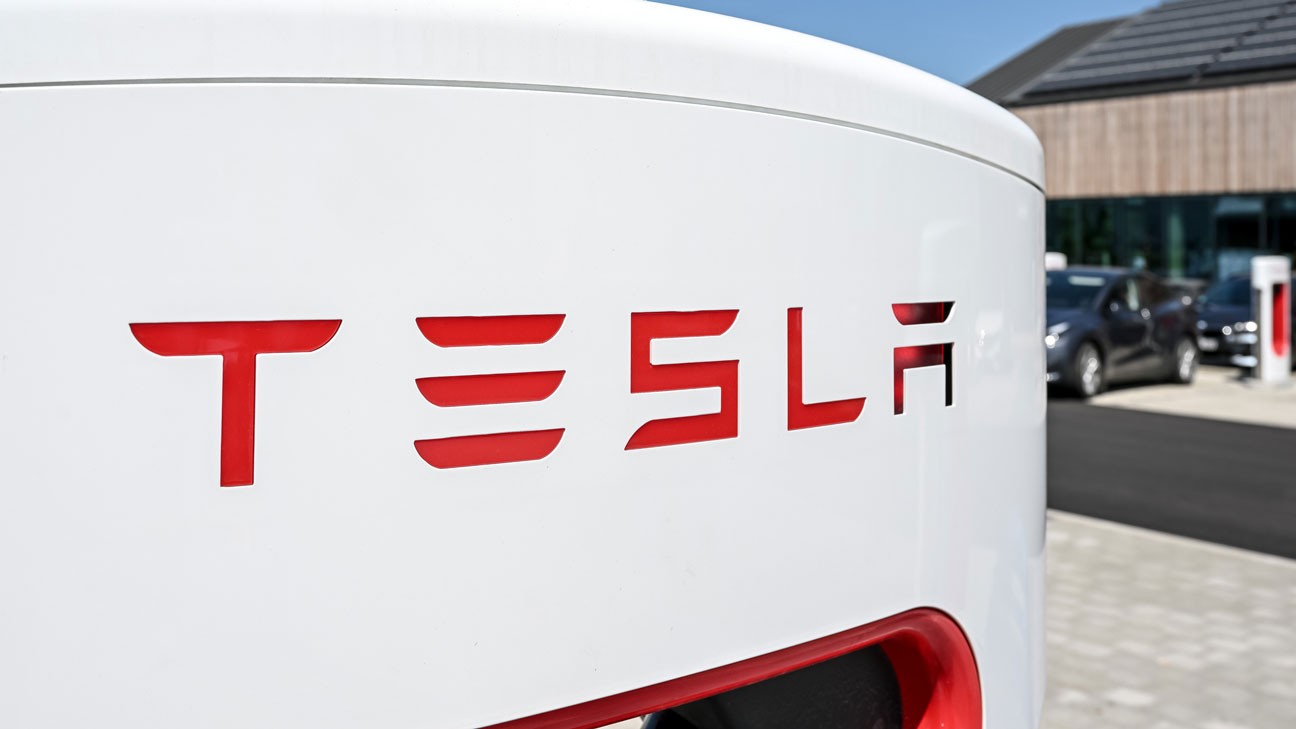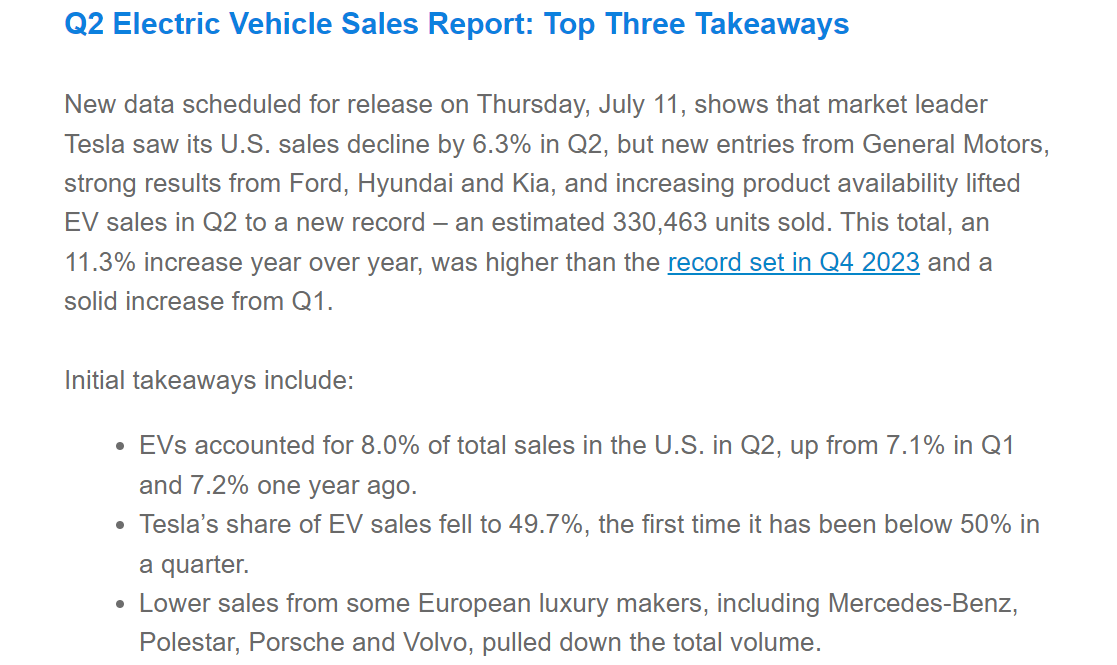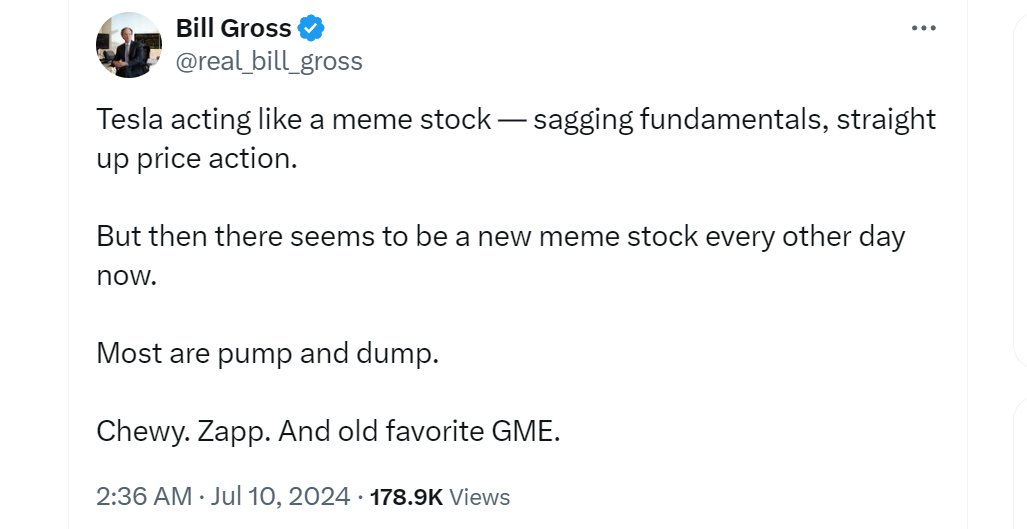Home Turf Also Under Threat? Tesla's US Market Share Falls Below 50% for the First Time
According to Cox Automotive, Tesla's sales in the United States in the second quarter of this year decreased by 6.3% year-on-year, with sales accounting for 49.7%. This is the first time Tesla has fallen below 50% in a quarter.

The latest report released by research firm Cox Automotive shows that Tesla's share of electric vehicle sales in the United States dropped below 50% for the first time in the second quarter.
The report shows that electric vehicle sales in the US market set a new record in the second quarter, with an estimated 330,463 units, a year-on-year increase of 11.3%, and a steady month on month growth. The penetration rate of electric vehicles has also increased. Electric vehicles accounted for 8.0% of total US car sales in the second quarter, up from 7.1% in the first quarter and 7.2% a year ago.
As is well known, Tesla has always dominated the electric vehicle market in the US. According to Cox Automotive, Tesla's sales in the United States in the second quarter of this year decreased by 6.3% year-on-year, with sales accounting for 49.7%. This is the first time Tesla has fallen below 50% in a quarter.

The report states that although market leader Tesla's sales have declined, the supply of products from other automakers such as General Motors, Ford, Hyundai, and Kia has increased, leading to a new high in the overall electric vehicle market in the United States.
Stephanie Valdez Streaty, Director of Industry Watch, said, "Although Tesla's sales continue to decline, with its share of electric vehicle sales falling below 50% for the first time, the overall competition for electric vehicles is further intensifying. This will lead to sustained price pressure, which will help drive a slow increase in the adoption rate of electric vehicles.
Previously, Tesla was basically the only choice for electric car buyers, but now the situation has changed. Over the past year, Tesla has had to lower prices multiple times to compete with other brands of electric vehicles that offer lower prices than gas.
Data shows that due to fierce competition among car companies such as Tesla, Hyundai, and General Motors, the race to promote new economical electric vehicles is gradually becoming a reality in the United States. Nowadays, almost every company offers long-range electric vehicles, and the prices of these cars are even lower than the average price of new cars in the United States. For Tesla, there were moments of crisis before the release of the new generation of low-cost sedans.
Tesla's multiple price reductions have also led to a sharp decline in the value of Tesla cars in the second-hand car market. Now, on the website of Hertz, a large car rental company in the United States, buyers can find Tesla models ranging from $21,000 to $36,000, with the majority being models from 2022 and 2023.
Despite a slower than expected year-on-year decline in sales, Tesla's stock price has performed astonishingly. In just the past five trading days, the company's stock price has risen by over 15%. This makes' Bond King 'Bill Gross believe that Tesla is another GameStop.
"Tesla acting like a meme stock — sagging fundamentals, straight up price action."Bill Gross wrote on X,"But then there seems to be a new meme stock every other day now. Most are pump and dump."

However, some Tesla bulls, including Wedbush's Dan Ives, claim that Tesla's stock price will continue to rise because the company is more like an artificial intelligence and robotics company than an ordinary car company.
On Wednesday (July 10th), Adam Jonas, a renowned automotive analyst at Morgan Stanley, lowered the valuation of Tesla's automotive business by $15 to $56 per share. In addition, Jonas has lowered his forecast for Tesla's car sales in 2030 to 5.7 million units, and has lowered his forecast for the penetration rate of pure electric vehicles in the United States from 25% to 20% in 2030. He believes that in the context of the revival of hybrid vehicles, the electric vehicle market will continue to slow down.
At the same time, Jonas raised the valuation of Tesla Energy from the previous $36 per share to $50 per share. Jonas believes that with the increasing demand for energy from Generative Artificial Intelligence (Gen AI), there is growing interest in Tesla's energy business. Jonas also predicts that Tesla Energy's profit margin will surpass the company's automotive profit margin by 2024 and is expected to reach 26% by 2030.
Previously, Tesla announced that its energy storage products had an installed capacity of 9.4 gigawatt hours in the second quarter, the highest quarterly installed capacity to date.
·Original
Disclaimer: The views in this article are from the original Creator and do not represent the views or position of Hawk Insight. The content of the article is for reference, communication and learning only, and does not constitute investment advice. If it involves copyright issues, please contact us for deletion.